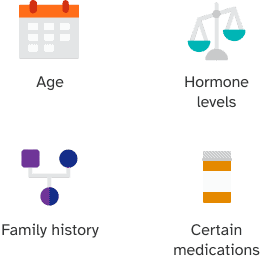Is Severe Acne Genetic?Explore Severe Acne and what your DNA can tell you
What is severe acne?
Severe acne is a common skin condition that occurs when hair follicles in the skin become clogged with oil, bacteria, and dead skin cells. This can lead to many deep and painful types of pimples along with many whiteheads and blackheads. Severe acne is most common on the face, but can also affect multiple parts of the body — including the neck, back, and chest. Severe acne can be persistent and lead to scarring, especially without proper treatment, which usually includes prescription medication.
Find Out if Your Genetics Might Increase Your Likelihood for Developing Severe Acne.

What are some complications of severe acne?
People with severe acne may experience the following:
- Scarring: After severe acne heals, scars can form. Enlarged and raised scars, called keloids, are more common in people with darker skin.
- Changes in skin color: Once severe acne clears up, the affected area may be lighter or darker than before, especially in people with darker skin.
- Psychological effects: For some people, severe acne and the associated complications can cause embarrassment, low self-esteem, anxiety, and depression.
For people who have severe acne, lifestyle modifications and other treatments, including medications, can help manage the condition and prevent complications.

Other factors that may cause an increased likelihood of severe acne
While up to 85% of Americans have experienced acne, it is estimated that less than 20% of Americans have experienced moderate to severe acne. Besides genetics, some factors that can increase a person’s chances of developing acne include:
- Age: The chances of developing this condition are highest during puberty and then decrease with age.
- Hormone levels: This condition is associated with changes in hormone levels, such as with puberty and the menstrual cycle. In addition, conditions that cause high levels of androgen hormones — including polycystic ovary syndrome (PCOS) and congenital adrenal hyperplasia — can increase the chances of developing severe acne.
- Family history of severe acne
- Currently taking certain medications

Find out if your genetics might increase your likelihood of developing severe acne
Curious whether you have an increased likelihood of having severe acne based on your genetics? 23andMe takes into account more than 8,500 genetic markers to estimate the likelihood of having severe acne. Find out more with the Severe Acne report (Powered by 23andMe Research), part of the 23andMe+ Premium membership. 23andMe+ Premium includes everything in our Health + Ancestry Service plus new premium reports and features throughout the year.

23andMe+ Premium
Please note
- The report does not diagnose severe acne and should not be used to make medical decisions.
- The report was developed by 23andMe scientists using data and insights gathered from thousands of customers who chose to participate in our research. Reports based on 23andMe research provide an estimate of your likelihood of developing a condition based on your genetics and other factors. This report does not account for lifestyle or family history.
- The report does not account for every possible genetic variant that could affect your likelihood of having severe acne.
References
Bhate K et al. (2013). “Epidemiology of acne vulgaris.” Br J Dermatol. 168(3):474-85.